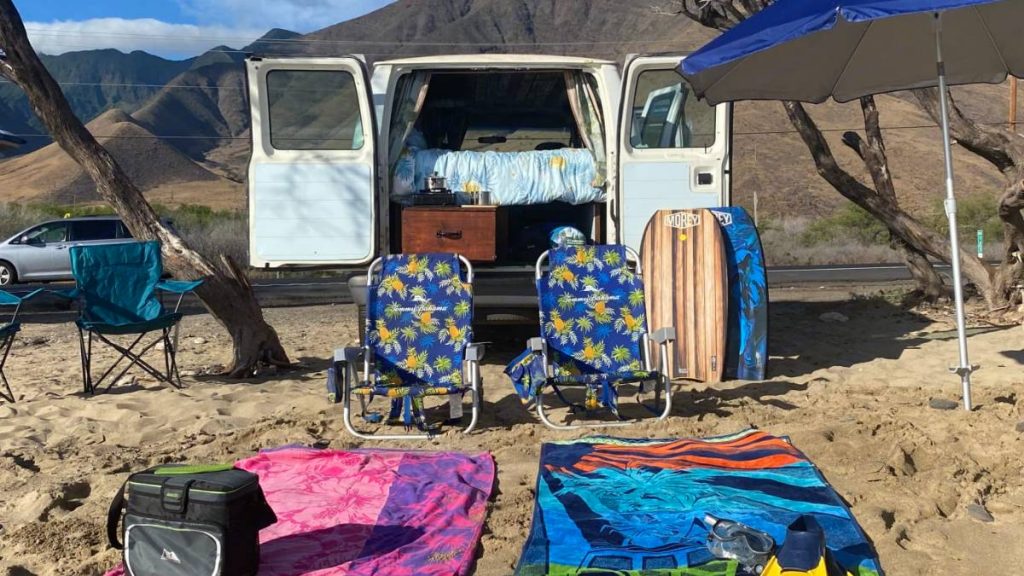Maui camper van owners push back on plans to regulate, prohibit mobile vacation dwellings

As Maui lawmakers mull plans to regulate or prohibit mobile vacation dwellings to curb overtourism, some camper van businesses are saying leaders are unfairly targeting some of the island’s most respectful visitors.
Happy Campers Maui LLC owners Ephriam Martinez and Amber Rinker of Kihei said their company pays taxes, follows county rules and rents vans to people who are “grateful, down-to-earth and humble.”
“These people that we host are far less a problem to the island than people in a resort,” said Martinez, who started their business in 2018. “They would never take advantage of the situation. In a resort, it’s all take advantage, all drinks and booze on the beach, all party time.”
Over-regulating or banning their small business that helps people who can’t afford high-priced hotel stays will create an “exclusive playground for the rich,” the two said.
“On the Mainland, that’s all people care about, catering to the rich,” Martinez said. “What is Elon Musk doing? What does Bill Gates want? Look at Facebook dude and Larry, the Oracle guy. Come on now, we need to be able to access this beauty for everyday, normal people, too.”
Maui County Council in committee on Thursday briefly discussed a plan that would prohibit mobile vacation dwellings, including camper vans, trailers and other recreational vehicles intended for human habitation. If approved, the use would be considered unpermitted transient accommodations and subject to stiff fines.
Opponents to mobile vacation dwellings say users camp illegally along coastlines, in neighborhoods and at county parks. They allege businesses skirt transient accommodation taxes, clog natural resources and produce litter.
Supporters say the small businesses are locally owned, tourism money should go to residents instead of hotels and vacationers often obtain reservations to legally camp. Also, they say many vehicles in public areas overnight hold homeless residents.
State law makes it illegal for a vehicle to be used as human habitation between 6 p.m. and 6 a.m. while it’s parked on any roadway, street, highway or other public property, Maui Police Department said via email.
“There are no ‘gray areas,’” the department added.
After pandemic shutdowns, Maui County tourism bounced back quickly, and current visitor arrivals are rivaling pre-pandemic record highs. Meanwhile, hotel prices have surged to some of the highest prices in recent history, with nights ranging from $300 to more than $1,000.
As a result, mobile vacation dwellings that charge between $100 to several hundred a night have proliferated, according to online listings.
Maui resident Tom Crowley testified during Thursday’s meeting that there are hundreds, if not thousands, of reviews on Airbnb for Maui mobile vacation dwellings.
“People are saying, ‘It’s real cool, you can park on the side of the road; you can park at the side of the beach; it’s great, but make sure you look for your place to park before it gets dark because it can get a little difficult after it gets dark,’” he said. “So that’s what you got going on.”
The proposal to prohibit mobile vacation dwellings to manage the impact of overtourism and to protect the environment was introduced by Council Member Tamara Paltin, whose residency seat covers West Maui. During the committee meeting Thursday, the item was deferred so details can be ironed out while an earlier measure on mobile vacation dwellings is heard at Maui Planning Commission.
Already, planning commissions on Moloka’i and Lana’i have indicated restrictions or bans on the use are supported.
The earlier plan seeks to ban the temporary parking of camper vans and recreational vehicles used for transient accommodations unless authorized by zoning and permit. It is part of a larger effort to cap the number of units used for visitor stays to curb overtourism.
“For one, it is having an impact on natural resources,” Paltin said after the meeting Thursday. “We don’t know where the waste is going. We’ve had numerous complaints about the toilet paper in the bushes or the rubbish in the bushes after a camper van leaves.”
Also, the businesses don’t contribute to taxes the same way that hotels and short-term rental homes do, she added. Plus, owners encourage people to sleep anywhere they want.
“They are skirting laws, encouraging people to sleep in public places,” Paltin said. “You’re promoting something illegal and you’re profiting off it.”
When called this week, two Maui mobile vacation dwelling businesses declined to comment on the proposed ban and restrictions. They said they follow rules and direct vacationers to public campsites that require reservations or permits. Some websites advertise privately-owned land that rents space for camping.
Happy Campers Maui LLC owners said that they tell visitors where it’s legal to camp and instruct clients about respecting the culture and the environment.
“People in a resort are using tons more of our resources than a couple of hippies in a camper van going around and seeing the beautiful sights,” Martinez said.
“We are working within the system, and we as business owners are paying our taxes,” he added. “We’re just asking for the same chance that the county gives to the Hilton and the Fairmont.”










